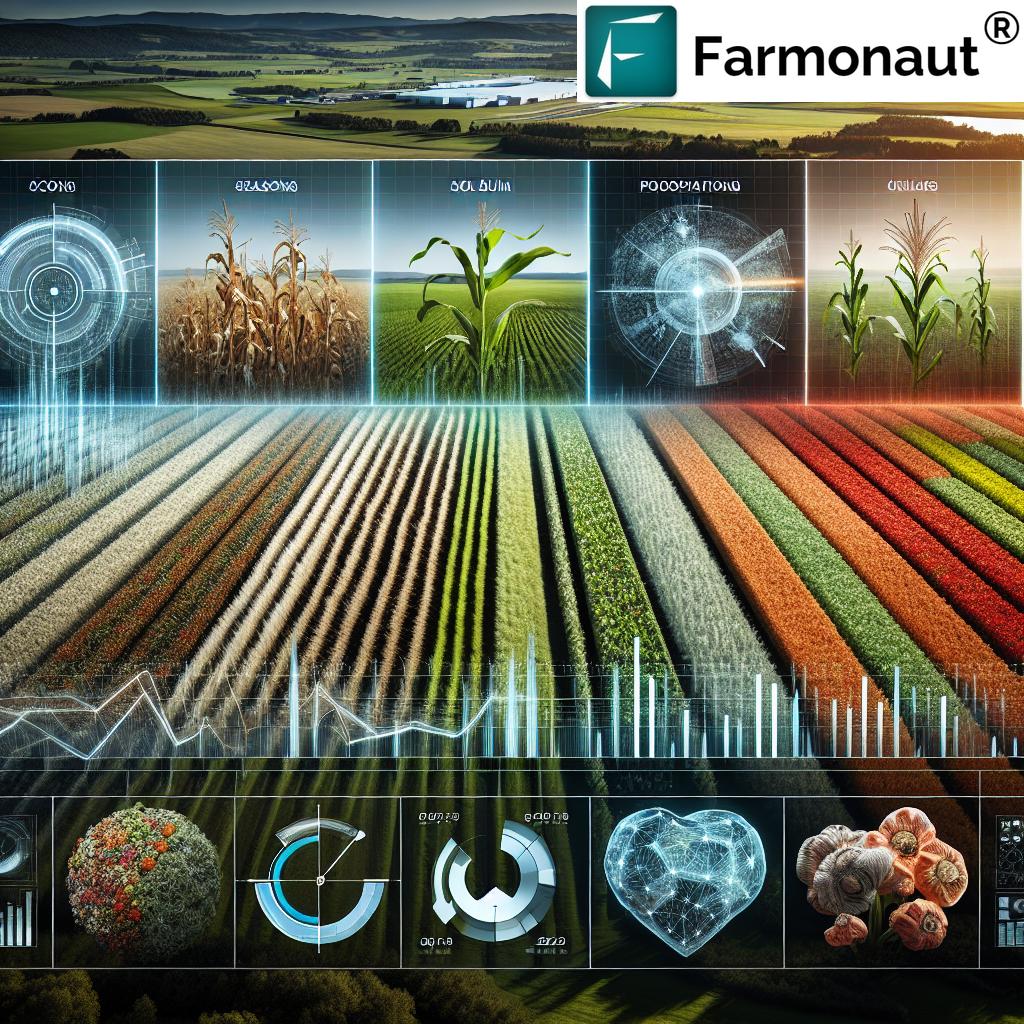2024 Crop Physiology and Metabolism Committee: Advancing Agricultural Research in Tifton, GA and Lubbock, TX
“The 2024 Crop Physiology and Metabolism Committee spans two key locations: Tifton, GA and Lubbock, TX, enhancing regional research diversity.”
As we approach 2024, the field of crop science is experiencing unprecedented advancements, with the Crop Physiology and Metabolism Committee at the forefront of these exciting developments. Our committee, comprised of leading professionals in agronomy and soil science, is dedicated to driving innovation in agricultural research and sustainable farming practices. With a focus on addressing the impacts of climate change on crops and advancing precision agriculture techniques, we are poised to make significant contributions to the future of agriculture.
The Structure and Mission of the 2024 Committee
Our committee’s structure is designed to leverage the diverse expertise of its members, spanning across two key locations: Tifton, GA and Lubbock, TX. This geographical spread allows us to address region-specific challenges while fostering a comprehensive approach to crop science innovation.

The committee’s mission is multifaceted:
- Advance understanding of crop physiology and metabolism
- Develop sustainable farming practices
- Investigate climate change impacts on crop production
- Promote precision agriculture techniques
- Foster collaboration between academia, industry, and government agencies
Key Research Areas and Initiatives
Our committee is focusing on several critical areas that will shape the future of agriculture:
1. Plant Metabolism Research
We are delving deep into the intricacies of plant metabolism, exploring how crops respond to various environmental stressors and nutrient conditions. This research is crucial for developing more resilient and productive crop varieties.
2. Climate Change Impact Studies
Understanding how climate change affects crop growth, yield, and quality is a top priority. Our researchers in both Tifton, GA and Lubbock, TX are conducting extensive studies to predict and mitigate the impacts of changing weather patterns on agriculture.
3. Precision Agriculture Advancements
We are at the cutting edge of precision agriculture, developing and testing new technologies that allow farmers to optimize resource use and increase yields. This includes the integration of satellite imagery, AI, and machine learning in farming practices.
In this context, it’s worth noting how companies like Farmonaut are contributing to the field. Farmonaut offers advanced satellite-based farm management solutions that align with our committee’s goals in precision agriculture. Their technology provides valuable insights for crop health monitoring and resource management.

4. Sustainable Farming Methods
Developing and promoting sustainable farming practices is crucial for the future of agriculture. Our committee is researching innovative methods to reduce environmental impact while maintaining or increasing crop yields.
Committee Structure and Expertise
Our committee brings together a diverse group of experts, each contributing unique skills and knowledge to our collective mission. Here’s an overview of our structure:
| Member Role | Area of Expertise | Research Focus | Location | Key Initiatives |
|---|---|---|---|---|
| Chair | Plant Physiology | Crop Stress Response | Tifton, GA | Climate Resilience Studies |
| Co-Chair | Soil Science | Nutrient Management | Lubbock, TX | Sustainable Fertilization Techniques |
| Member | Agricultural Biotechnology | Genetic Crop Improvement | Tifton, GA | Drought-Resistant Crop Development |
| Member | Precision Agriculture | Remote Sensing Applications | Lubbock, TX | Satellite-Based Crop Monitoring |
| Member | Agricultural Economics | Policy and Market Analysis | Tifton, GA | Farm Bill Impact Assessment |
“Experts in this committee cover at least 5 crucial areas: agronomy, soil science, plant metabolism, agricultural policy, and education.”
Advancing Agricultural Research: Our Approach
Our committee’s approach to advancing agricultural research is multifaceted and collaborative. We believe in combining traditional agronomic knowledge with cutting-edge technology to drive innovation in crop science.
Integrating Technology in Research
We are leveraging advanced technologies to enhance our research capabilities:
- Satellite Imagery: Using high-resolution satellite data for crop monitoring and analysis
- Artificial Intelligence: Developing AI models for crop yield prediction and disease detection
- IoT Sensors: Deploying field sensors for real-time data collection on soil and crop conditions
- Big Data Analytics: Analyzing large datasets to uncover patterns and insights in crop physiology
In this realm, we recognize the contributions of companies like Farmonaut, which provide valuable tools for precision agriculture. Their satellite-based crop health monitoring aligns well with our research goals.
Explore Farmonaut’s API for Agricultural Data
Collaborative Research Initiatives
Our committee fosters collaboration between various stakeholders in the agricultural sector:
- Inter-institutional Research Projects: Partnering with universities and research institutes across the US
- Industry Partnerships: Collaborating with agtech companies to test and implement new technologies
- Government Collaborations: Working with federal agencies to align research with national agricultural priorities
- International Cooperation: Engaging in global research initiatives to address worldwide agricultural challenges
Climate Change and Agriculture: Our Research Focus
Climate change poses significant challenges to agriculture, and our committee is at the forefront of research to understand and mitigate its impacts.
Key Research Areas in Climate Change
- Crop Resilience: Developing varieties that can withstand extreme weather conditions
- Water Management: Researching efficient irrigation techniques for water-scarce regions
- Carbon Sequestration: Studying how agricultural practices can contribute to carbon capture
- Pest and Disease Dynamics: Understanding how climate change affects pest populations and disease spread
Tools like those offered by Farmonaut, which provide satellite-based monitoring of crop health and soil conditions, are invaluable in this research. They allow for large-scale data collection and analysis, crucial for understanding climate impacts on agriculture.
Learn More About Farmonaut’s API Developer Docs

Precision Agriculture: The Future of Farming
Precision agriculture is revolutionizing the way we approach farming, and our committee is at the forefront of this transformation.
Advancements in Precision Agriculture
- Remote Sensing: Using satellite and drone imagery for crop monitoring
- Variable Rate Technology: Applying inputs like fertilizers and pesticides at variable rates based on field conditions
- Soil Mapping: Creating detailed soil maps for optimized crop management
- Yield Monitoring: Implementing technologies to accurately measure and map crop yields
In this context, technologies like those developed by Farmonaut play a crucial role. Their satellite-based farm management solutions provide farmers with real-time data on crop health and soil conditions, enabling more precise and efficient farming practices.
Download Farmonaut’s Android App

Sustainable Farming Practices: Our Research and Recommendations
Sustainability is at the heart of our research agenda. We are committed to developing farming practices that are not only productive but also environmentally friendly and economically viable.
Key Sustainable Farming Initiatives
- Conservation Tillage: Researching methods to minimize soil disturbance and improve soil health
- Cover Cropping: Studying the benefits of cover crops for soil improvement and pest management
- Integrated Pest Management: Developing strategies to reduce chemical pesticide use
- Crop Rotation: Optimizing rotation schedules for improved soil health and pest control
Technologies that aid in implementing these practices are crucial. For instance, Farmonaut’s satellite-based monitoring can help farmers track the effectiveness of their sustainable farming practices over time.

Education and Outreach: Preparing the Next Generation
Our committee recognizes the importance of education in advancing agricultural science. We are committed to nurturing the next generation of crop scientists and agronomists.
Educational Initiatives
- Undergraduate Research Programs: Offering opportunities for students to engage in cutting-edge research
- Graduate Fellowships: Supporting advanced studies in crop physiology and metabolism
- Webinars and Online Courses: Providing accessible education on the latest agricultural technologies and practices
- Industry Internships: Facilitating internships with agtech companies to provide real-world experience
We also encourage students to familiarize themselves with modern agricultural technologies. For instance, understanding how to use satellite-based farm management tools like those offered by Farmonaut can be a valuable skill for future agronomists.
Agricultural Policy and Legislation: Our Role
Our committee plays a crucial advisory role in shaping agricultural policy and legislation. We provide scientific insights to policymakers to ensure that agricultural policies are grounded in the latest research.
Key Policy Areas
- Farm Bill Recommendations: Providing input on research funding and sustainable farming incentives
- Climate Change Policy: Advising on policies to help agriculture adapt to and mitigate climate change
- Research Funding Allocation: Recommending priority areas for agricultural research funding
- Regulatory Guidelines: Providing scientific basis for regulations on pesticide use, genetic modification, and other agricultural practices
Future Outlook: The Road Ahead
As we look towards the future, our committee is excited about the potential advancements in crop science and sustainable agriculture. We anticipate significant developments in:
- Gene Editing Technologies: Developing crops with enhanced resilience and nutritional value
- AI-Driven Farming: Implementing machine learning for optimized crop management
- Vertical Farming: Exploring urban agriculture solutions for food security
- Biofortification: Enhancing the nutritional content of staple crops
The integration of advanced technologies, like those offered by companies such as Farmonaut, will play a crucial role in realizing these advancements. Their satellite-based solutions provide valuable data that can drive informed decision-making in agriculture.
Farmonaut Subscriptions
Frequently Asked Questions (FAQ)
Q: What is the primary focus of the 2024 Crop Physiology and Metabolism Committee?
A: Our committee focuses on advancing agricultural research, particularly in crop physiology, metabolism, sustainable farming practices, and addressing climate change impacts on agriculture.
Q: How does the committee contribute to precision agriculture?
A: We research and develop advanced technologies for precision agriculture, including satellite imagery analysis, AI-driven crop management, and IoT sensor deployment for real-time field data collection.
Q: What role does the committee play in agricultural policy?
A: We provide scientific insights and recommendations to policymakers on crucial areas such as the Farm Bill, climate change adaptation, research funding allocation, and agricultural regulations.
Q: How can students get involved with the committee’s work?
A: We offer undergraduate research programs, graduate fellowships, webinars, and internship opportunities to engage students in cutting-edge agricultural research and practices.
Q: What are some key sustainable farming practices the committee is researching?
A: Our research includes conservation tillage, cover cropping, integrated pest management, and optimized crop rotation schedules to improve soil health and reduce environmental impact.
As we continue our work in advancing agricultural research and sustainable farming practices, we invite professionals, students, and enthusiasts to join us in shaping the future of agriculture. Together, we can create a more sustainable and productive agricultural sector that meets the challenges of the 21st century.



